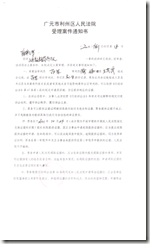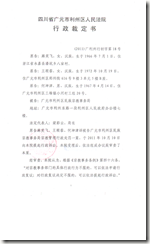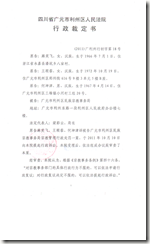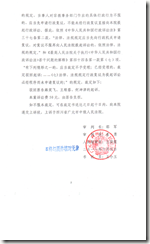China Aid Association
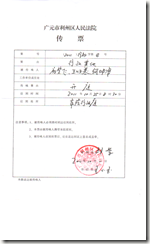
As ChinaAid had previously reported, the Lizhou District Bureau for Ethnic and Religious Affairs in the city of Guangyuan, Sichuan province, banned the Shangxi house church on June 24, saying that the church leader was “not a clergyman and was engaged in religious activities at a venue not designated for religious activities.”
The house church was outraged and responded with a lengthy and well-argued petition on Sept. 13 showing that their church is in compliance with the law. (see chinaaid.org/officials-ban-house-church-in-sichuan/) Following that, on Sept. 21, the church submitted its administrative lawsuit at Lizhou District People’s Court in accordance with the “Administrative Procedure Law of the People’s Republic of China.”
The plaintiffs were two women – Ma Xiaofei and Wang Shunrong – and a man, He Kunjin, who are members of the church. The suit argued that the defendant, the Lizhou District Bureau for Ethnic and Religious Affairs, had violated legal procedures in banning Shangxi Church and that the ban has no legal basis and is an incorrect application of the law.
The Lizhou District People’s Court issued a “Notice Accepting a Case” on Oct. 10 in which it acknowledged receipt of the suit. It said, “following a review, it has been determined that this suit meets the requirements for filing a case and the court has decided to accept and hear the case.”
The following day, Oct. 11, the plaintiffs received a court summons, telling them that the hearing had been set for 8:30 a.m. Oct. 24 and admonishing them to show up on time. (see scan of court summons above)
To their surprise, when they showed up that morning, they were informed that the court had changed its mind and rejected the case, on the grounds that an administrative review had to be first conducted before the church could file an administrative lawsuit.
Even more surprising was that the date of the “administrative judgment” rejecting the appeal and canceling the court session was Oct 9. In other words, the case had already been rejected when the court issued its Oct. 10 “Notice of Accepting a Case by Lizhou District People’s Court” and the Oct. 11 summons with the hearing date and time.
The church representatives who filed the lawsuit were both disappointed and confused, but nonetheless expressed their belief that, with God’s help and protection, they will succeed in winning the legitimate rights to freedom of religion for their church and its members.
As for the absurd decision of the Lizhou District People’s Court, the church and its lawyer on Oct. 25 immediately submitted an administrative appeal to the Lizhou District Intermediate People’s Court. Saying that “the court of the first instance has wrongly applied the law and the way this case has been handled violates the law,” they demanded that the administrative judgment rejecting the suit be nullified.
Their appeal solemnly points out:
1. If the court of the first instance had accepted the plaintiffs’ case on Oct. 10, why was there this Oct. 9 administrative judgment? This shows that the court had already decided to reject the suit before it accepted the case. This obviously violates the court’s procedures for handling cases as well as the relevant regulations of the Administrative Procedure Law.
2. The court’s administrative judgment to reject the case was made in the name of the full court and dated Oct. 9, but the administrative judgment itself records the full court being formed after Oct. 10. This means the administrative judgment was made before the full court was formed and the judgment was signed by an impostor.
3. Since the judgment was already made on Oct. 9, why did the court of the first instance on Oct. 11 issue a summons to the plaintiffs to show up for a hearing? For the court of the first instance to wait until the plaintiffs had brought their lawyer from far away and then refuse to hear the case, isn’t this making a child’s game of the law?
ChinaAid has been closely following the developments in this case. We are shocked at this trampling of freedom of religious belief and this playing games with the legal system. We strongly denounce such actions, which once again demonstrate that the Bible exhibition put together by China’s State Administration for Religious Affairs and currently touring the United States is an attempt to cover up the truth of persecution suffered by countless churches and Christians in China.
Click on the scans below to view larger images of the court documents.
“Notice Accepting a Case by the Lizhou District People’s Court”
“Administrative Judgment of the Lizhou District People’s Court”
China Aid Contacts
Rachel Ritchie, English Media Director
Cell: (432) 553-1080 | Office: 1+ (888) 889-7757 | Other: (432) 689-6985
Email: [email protected]
Website: www.chinaaid.org

